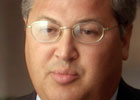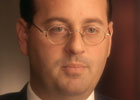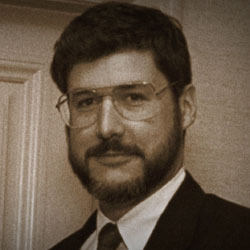
David Addington
They've worked together for two decades and share a common goal: to gather as much power for the president as possible. A very private person, Addington rarely speaks to the press. Here, colleagues and journalists describe him, what he's like to work with, and the way he reads the Constitution -- and the powers it grants a president.
- Jane Mayer
- Jack Goldsmith
- Ron Suskind
- Bradford Berenson
- Barton Gellman
- Bryan Cunningham
- Evan Thomas
- Related Links
- The Hidden Power
"Conventional wisdom holds that September 11th changed everything, including the thinking of Cheney and Addington. … But a close look at the twenty-year collaboration between Cheney and Addington suggests that in fact their ideology has not changed much. It seems clear that Addington was able to promote vast executive powers after September 11th in part because he and Cheney had been laying the political groundwork for years." (The New Yorker, July 3, 2006) - Cheney's Guy
Though Addington declined to be interviewed, many of his White House colleagues spoke to U.S. News & World Report for this profile of "the most powerful man you've never heard of." (May 21, 2006)
Jane Mayer
The New Yorker

He's a very mysterious character, really, partly because he never allows himself to be photographed. He looks like a sea captain; he's got a gray beard, and he's got a kind of thickening middle. He's middle aged, and he's very gruff and incredibly forceful behind doors in meetings. …
He takes the subway to work. He's very abstemious and self-denying in many ways. He's deeply devoted to his principles, and people who believe in the same things he does think that he's a tremendous public servant. He's a very powerful and persuasive guy.
Somebody says he walks around with a copy of the Constitution in his pocket?
He does. He walks around with a copy of the Constitution in his back pocket, but it's open to a certain section, which I always thought was very interesting. It's about how power should be transferred in case of emergency and the president dies. And so it's all about how the government should function in a catastrophe. He's ready, just in case. …
What's behind his single-mindedness?
If you talk to people who've known him all his life, there's an arrogance behind David Addington. He's always thought he was more right than anybody else in the room, from the time he was in high school, and he doesn't listen to other people. And if there are people who disagree with him, he either ridicules them or rejects them and pushes them out of the room. So decisions were made in very small groups with people who would follow along with him.
Jack Goldsmith
Assistant attorney general, Office of Legal Counsel, 2003-'04
Addington let me know quite clearly about what he thought about my actions at the Office of Legal Counsel [OLC] trying to fix these opinions. He told me one day in a meeting -- I can't remember what the issue was, but there were top administration lawyers there, and Addington pulled out of his coat pocket a 3-by-5 card that he carried right next to the copy of the Constitution that he kept in his pocket. He said that he had been keeping a list of all of the OLC opinions that I had withdrawn or revised, and that he thought it was appropriate for me to go through every single OLC opinion and let the White House know what I stood by and what I didn't, because the president needed to know what he could do and what he couldn't do in the war on terrorism.
Now frankly, this was in some sense a perfectly legitimate question for him to ask. I had taken some extraordinary steps and done some extraordinary things in withdrawing and revising some opinions. That was kind of the prelude. …
Is Addington a guy who is completely surrounded by staff, churning out position papers? How does he do it?
When I was there, Addington operated almost entirely alone. He was remarkable for having no staff. He had, as I recall, one person working for him, one morning a week, doing I believe mostly administrative and technical things. But one of the many remarkable things about David Addington was he did all of his own work. And he did a lot of it. He had his fingers in many, many pots, and he had views on most of the things that he looked at.
[What was he like to work with?]
He was many things. He had a lot of experience, so he could always make arguments from precedent or the way things had been done before, which was very powerful in these arguments. He was very tough in making his arguments. He was very sarcastic and aggressive against people with whom he disagreed, and dismissive oftentimes. He was learned. He knew a lot about precedents and practices, and he acted with the implicit blessing of the vice president. All of these things made him a very, very forceful presence.
How did you know he had the "implicit blessing" of the vice president?
I say implicit because it was never explicit. ... I don't ever recall him invoking the vice president's authority. But everyone understood that ... he and the vice president were on the same page, and everyone understood that the arguments that Addington was making in these meetings were the arguments that the vice president was going to be making to the president. ...
[What was it like to argue with Addington?]
David could be very, very aggressive in his arguments, sometimes personal and ad hominem, often mixed with precedents, arguments, knowledge, directions from the president. It was a bombastic mixture of argumentative strategies. ...
There were two questions that Addington always asked: "Do you think we have the power on our own to do what we're doing?" And the answer was yes, there were good legal arguments for it.
The second question was: "Is it possible that if we go to Congress the president might not get what he wants, and the Congress might place restrictions on the president, and the president might conceivably be left in a weaker position, thereby making it harder for him to protect Americans?" And the answer to that question was always yes. Those two questions usually ended the argument. ...
Ron Suskind
Author, The One Percent Doctrine
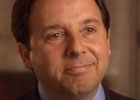
Addington's a guy who, unlike Goldsmith, has access to the threat reports, to the threat matrix. He has a sense of what Cheney and Bush and others are getting in terms of daily reports from CIA and NSA and others. … So Addington essentially says, "I'll lay down on the railroad tracks on this wiretap stuff."
So on the NSA program and how information is controlled here, what's the relevance?
Look, this falls under the category, information is real power. And what happens when you've got this culture of secrecy is that only certain people are allowed to know everything. And Addington knows everything, but Goldsmith doesn't. …
What this does is it makes every meeting a mismatch. Because across the table, even if you have a sound and seemingly rightful position, you've got someone, whether it's Addington, or the vice president, for that matter, saying, "If you knew what I knew, you'd agree with me, though I can't tell you what I know. Sorry. You just have to trust me." …
He's renowned as being a guy who carries a Constitution around in his pocket. What do you make of that?
Addington does carry the Constitution around in his pocket. There are some folks who say that it's a prop. Other people who say that's so he knows which pages to tear out at the right time.
But that's part of understanding David Addington. He feels that head-to-head conflict and collision in rooms with the door shut, at those mahogany tables, is something that the future of the country will really rest on. He gets it. He understands that these bureaucratic battles really do matter. They matter in how the ship of state is guided. And there are lots of folks who maybe don't understand with quite that clarity. And that gives Addington an advantage in the hand-to-hand combat.
Bradford Berenson
Associate White House counsel, 2001-'03
I think he came to the job with a fairly dim view of the competencies of the Congress, again, particularly in the realm of foreign affairs and national security. He had a strong view of the unitary executive, which has long been an article of faith among judicial conservatives, which essentially holds that ... the Constitution, through the vesting clause in Article II, makes the president the sole head of the executive branch of government and gives him essentially plenary authority to control the conduct and activities and choices made in the executive branch. ...
What part of this was his belief system and his theory, and what part of it was the vice president's? ...
I didn't have any direct window into his relationship with the vice president, but it was always my impression that there wasn't a sliver of daylight between the two of them on these issues. ...
Barton Gellman
The Washington Post
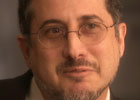
What Addington does for Cheney is bring a remarkably broad and deep-in-his-head understanding of what the rules and regulations are. He is said to be able to go through a 400-page piece of legislation in amazingly swift time. He will come out an hour later with redline markups on 30 or 40 pages, scattered over the 400 pages and hand it back to someone. He's swift. He's got an eye for exactly where the limits are on executive power, and he's the guy more than anyone who helps Cheney find the pivot points where decisions are made. …
[Is Addington a political guy?]
Addington is extraordinarily well versed in constitutional law, in budget process, in the development of statutes over the years. He knows exactly what he thinks is right and wrong.
He has a very strong philosophy. He is described by everyone I've talked to as having an absolute political tin ear. He has no idea how things are going to play out, and to the extent he does, he doesn't care. Popularity, public relations, as he often describes it, mean nothing to him. In fact, when he would sit in an interagency meeting and someone like John Bellinger, then [Condoleezza] Rice's lawyer at the NSC, would say to him that this policy is doing us enormous damage with coalition partners that we're relying on, Addington would say, "We're not going to change our policy because of some idea about public relations."
It's fairly extraordinary that he sees alliance building as a form of public relations. But he just doesn't care about political reactions. And you see this over and over again where Cheney and Addington are the last holdouts to public testimony by Rice, for example, at the 9/11 Commission; where they're the last holdouts to letting any of the commissioners see the president's daily intelligence brief. And most of the lawyers are telling them all along, "You could make a plausible legal argument for executive privilege here … but the political force is overwhelming. You're going to lose on this. You're going to cave. Don't drag it out. It's going to make you look weak." And they do drag it out, and the president does cave because he's not as committed as Cheney is to the ultimate assertion of executive power and executive privilege.
Bryan Cunningham
Deputy legal adviser, National Security Council, 2002-'04
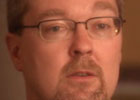
David Addington was the legal office of the vice president. He had one part-time lawyer who assisted him, but he was the entire office. A 100-page, single-spaced piece of legislation would come through for coordination with an hour deadline set by the Office of Management and Budget. And in 25 minutes you'd see an e-mail or a document from David with three-dozen comments, down to, "Here's the place in the U.S. Code that this provision of legislation would fit, and here's the effect of it." So to some degree they just outworked you. But they also were participants at every level of the process. The folks in their office were involved in every level of the NSC process and they were very smart about it. …
Give me an example of how he outworked you and would know things at that level of detail.
… One of their objectives was to guard against what they saw as further erosion of presidential authority. And I think their view was as much as that that erosion had happened because of careless lawyering on the part of previous administrations, as [much as] any kind of ideological decision. …
What David, I think, tried to do was be very, very disciplined about always -- in every piece of legislation, in every executive order, in every signing statement -- guarding against what he viewed as further erosion of executive power. …
Evan Thomas
Newsweek
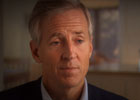
On the surface, Addington is a perfectly faceless guy. He doesn't flaunt his power. He doesn't use his parking space at the White House. He takes the Metro to work. At lunch, he has the same bowl of gazpacho in the White House mess. He seems like a pretty gray and faceless bureaucrat.
But once you start talking to him, he can go from mild to hot pretty quickly. And he's sarcastic. He makes effective use of sarcasm and his own great intelligence and his ability to put people down to wield a pretty sharp knife in small meetings.
Even though the key principals in this administration are not lawyers by trade, they surround themselves with a lot of influential lawyers. How do you view that?
Lawyers are essential to post-Watergate Washington, usually to say no, to tell you what you can't do. Every agency has a bunch of them, and in general their advice is no. Addington was the opposite kind of lawyer. He said yes. He said, "Yes, you can do this." That made him a very valuable lawyer in the administration of George Bush when they were trying to do a lot of things after 9/11.
What do you mean by that?
Most lawyers are careful and cautious. They look at the laws, particularly the laws that have grown up over time and since Watergate that put limits on power, and they're always saying to executive branch types, you know, "There's a law that says you can't do this," or "You have to protect somebody's rights," or "You have to have permission to do this," or "You have to have a finding or some authorization."
Addington took a different approach. He said the office of the president has inherent power, executive power, under the Constitution, particularly when it comes to defending the nation, that allows it to skip a lot of these steps. You don't have to dot every "i" and cross every "t". The Constitution gives the president the power. …
David Addington is, in some ways, a tragic figure because he's going to be vilified for overdoing it. On the other hand, he's a guy who served all his life in government, doing what he thought was right for his country. He didn't sell out and take the big bucks. He's worked like a dog. He's principled. It's just that his principles maybe permitted the government to do more than it really should be able to do.
home . introduction . watch online . interviews . themes . join the discussion
producer's chat . readings & links . site map . dvd & transcript . press reaction
teacher's guide . credits . privacy policy . journalistic guidelines . FRONTLINE series home . wgbh . pbs
posted october 16, 2007
FRONTLINE is a registered trademark of wgbh educational foundation.
main photograph © corbis, all rights reserved
web site copyright WGBH educational foundation

